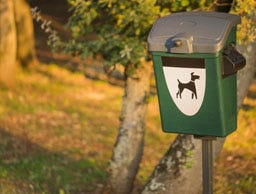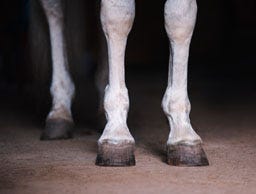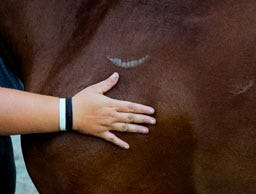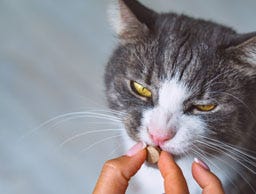How to Care for Your Dog's Joints
It’s an inevitable part of life that our bodies begin to lose mobility as we get older. As with humans, dog joint health deteriorates as they mature, although younger dogs can also be susceptible to inflammation of the joints. In this post, you'll learn how to spot dog joint problems, what causes these issues and how to care for your dog's joints to prevent and alleviate problems.
The importance of joint care for dogs
Looking after your dog's joints is an important part of their daily healthcare, regardless of age. It can be easy to overlook joint care in young puppies and dogs as they're bouncing around causes all sorts of mischief, but paying attention to their joints from the start can protect them in later years. Puppies also need their joints looked after so that their joints develop properly and are strong enough to support their growing muscles. This is especially true for large-breed puppies, as larger dogs are more prone to joint problems.
Although arthritis is common in older dogs, and is just part of the ageing process, being aware of joint care early can slow the advancement of this degenerative disease and keep them active for longer. In older dogs that have joint problems, joint care can help alleviate any pain and inflammation, helping them to stay active.
Cartilage and joints
When we talk about joint care, it is normally about protecting the cartilage. This is a tissue found at the end of bones in the joint that provides cushioning, stopping the moving parts of the joint from rubbing together and working as a shock absorber. Cartilage is made from chondrocytes (specialist cartilage cells) and proteins to create a sponge-like mass.
Over time, this cartilage naturally gets worn down, causing joint and mobility issues. Providing your dog with joint care throughout their life can help keep this cartilage healthy and help your dog to produce enough to keep their joints cushioned and protected.

Signs of joint problems in dogs
Dogs tend to hide if they are uncomfortable, so it's important to watch out for the small signs that can point to joint problems in dogs. Look out for:
- Licking or gnawing around joints
- Limping or slow movement after exercise or when getting up
- Tiredness
- Irritability
- Muscle wastage due to less weight-bearing of the joint
- Cautious of you touching around the joint
If you notice any of the above signs, get your dog booked in with a vet, as it's best to have them checked out, just in case.
What causes joint problems in dogs?
Joint problems in dogs can flare up because of a variety of reasons, with some dogs being more susceptible than others. If your dog does get joint issues, often it's nothing you've done wrong, it's just their risk factor was high. Some common things that increase your dog's chance of joint and mobility issues are:
Age
Just like humans, a dog's body will naturally start to deteriorate with age. Unfortunately, this is all part of the natural ageing process and can lead to arthritis. The older a dog gets the more likely it will develop joint problems. Although there's nothing you can do about this natural process, you can help them to stay active by caring for their joints throughout their life.
Breed
Some dog breeds are much more likely to develop joint problems than others. This can b being prone to arthritis, hip or elbow dysplasia, for example. Breeds that are prone to joint issues tend to be large and giant breeds, such as:
- Mastiffs
- Rottweilers
- German Shepherds
- Great Danes
- Labrodors
But it's not just large breeds that can be prone to joint issues, smaller, active breeds can easily damage their joints, causing issues in later years.
Obesity
Additional weight can put added pressure on bones and joints. This puts strain on the joints as the cartilage can't cushion the joints as well as it could if your dog was a healthy weight. Obesity can also cause additional health problems, so it's important that you keep your dog at their ideal weight.
Injuries
If your dog had an accident or injury when they were younger, this could make them more susceptible to joint issues as they age. For instance, ligament damage or a broken bone can make the joint in question more susceptible to arthritic conditions. Too much exercise can also have the same effect on a dog's joints.
How to Care for Your Dog's Joints
It's never too early to start caring for your dog's joints, even puppies can benefit from joint care. And starting early gives your dog added protection against joint issues as they age. Whatever your dog's age, here are some ways you can protect their joints:
Feed the correct diet
Feeding the correct diet throughout their life can help protect your dog from joint issues. This means feeding puppy food when they are young, suitable adult food during their adult life and mature food as they enter their senior years. Ensure you are feeding them high-quality, complete food without too many treats to ensure they are getting all the vitamins, minerals and nutrients that they need. Puppy food will help your dog grow at the correct rate, but if you feed your puppy the incorrect food, it can cause them to grow too quickly, which can cause joint issues. Mature food tends to have extra ingredients to support the joints, plus weight management benefits.
For larger dogs, a food tailored to large breed needs is also a good idea, as these foods tend to have added joint support. Some breeds will also have breed-specific dog foods available with brands such as Royal Canin, which will be even more specifically tailored to help protect against the breed's common health issues. Many of these foods will also have foods tailored to the different life stages.
Royal Canin Junior Giant Breed Puppy Food is specifically designed for giant breed dogs between 8 and 24 months, with the correct balance of nutrients to support joints and bone consolidation during growth and later life.
Give them the correct amount of exercise
Exercise is just as important for dogs as it is for humans; too much or too little can cause joint issues. Too little can lead to obesity, which can be a significant factor in causing joint issues, too much can cause joint damage.
It's also important to exercise your dog correctly for their age and breed. For instance, although puppies need plenty of exercise, they also need plenty of rest for growth and development. So short and frequent exercise is better than one long walk. When it comes to breeds, think about what your dog can do, for instance, bulldogs are simply not built to run along with a bike.
When it comes to exercising your dog, doing something every day is best, rather than just going for long walks at the weekend and doing no exercise during the week. A combination of different exercises is also a good idea as it can work your dog in different ways, whether this is running, lead walking, swimming and more.
Here are some tips for giving your dog the correct exercise:
- Walks are the most common form of exercise for dogs, but be sure not to demand too much. For instance, a younger pup may benefit from 20 minutes twice a day rather than 40 minutes. Also, older dogs may appreciate a nice, flat walk rather than a hilly walk.
- Swimming is generally a good choice, as it has a lighter impact on their joints. Hydrotherapy is a good way to exercise if your dog has joint issues too.
- If your dog enjoys running alongside you, try to stick to softer surfaces for your dog to run on. Running on hard surfaces for long time can cause joint damage in the long term.
- When playing fetch, keep your throw low to the ground so your dog isn't tempted to jump, especially if your dog is very young or in their senior years
- Play dates are a great way to exercise your dogs, as it also allows them to socialise. Allowing them to play also allows them to regulate their own exercise and rest when they need a break.

Use joint supplements for extra support
Most high-quality dog food should give your dog everything they need to stay healthy. However, if your dog is more susceptible to joint issues due to previous injuries, activity, weight, age or breed, giving them joint supplements for dogs can help protect their joints. If you have a large breed dog that is not being fed a large breed food, additional joint support through supplements is definitely a good idea.
Synoquin Large Breed is a nutritional joint supplement specifically formulated to support joint mobility in large-breed dogs weighing over 25kg.
Common supplement ingredients that help with joints include:
- Glucosamine
- Chrondotin
- Omega-3 fatty acids
- Anti-oxidants
Joint supplements aren't just for older dogs, either! Joint supplements like YuMOVE Active Dog and Flexadin Advanced Dog Chews can help protect your dog's joints no matter their age, especially if they are active. These supplements are packed with fatty acids to support the metabolism of osteoarthritic joints and keep them running, chasing and jumping to their heart's desire.
Ensure your dog is the correct weight
Keeping your dog at their ideal weight can also help with protecting their joints and keeping joint issues at bay. This can be done through a combination of being on the correct diet, without too many treats, and exercise.
As obesity is a risk factor when it comes to joint issues, ensuring they are fit and healthy helps to keep away the joint issues. If you are worried about your dog's weight, speak to your vet.
If your dog needs to lose a few kilos, you can find weight management food in our condition-specific dog food range.
Make the home joint safe
One that is mainly for older dogs with joint problems is simply making the home environment easier for them to get around. This will reduce any extra strain on the joints, preventing and reducing further damage. Just like you'd try to make life easier for a senior relative, you can do the same for an older dog.
Simple changes like ensuring your dog has soft bedding that's low to the ground and using ramps to get in and out of the car can help an older dog. You can also lay rugs down on hard flooring in areas that your dog often walks through.
Although these changes are mainly for making an older dog more comfortable, they can also help to protect a younger dog's joints. For instance, if you regularly take your pup on car journeys, jumping in and out of the car regularly can cause damage in the long run, so a ramp can help protect them from this.
Have them vet checked regularly
A regular examination from a vet can help diagnose any joint issues early. This will help you to make any changes needed to prevent joint issues from getting worse and help your dog to stay active. Ideally, you should be getting your dog fully checked every year when you take them for their jabs.
Dogs and their joints
Although joint issues are a natural part of the ageing process, you can still help them to lead a healthy, active life even in their later years. Using the steps above, you can help to alleviate inflammation and pain and protect them from further damage. Starting joint care from an early age can also help to keep joint problems at bay for longer, in fact, you can never start joint care too early.
If you'd like some help choosing the right joint supplement for your dog, get in touch with us and a member of our friendly team will be happy to help.
This article is intended as a guide only. If you have any concerns about your pet's health, get them checked by your vet. Also, speak to your vet before you make any change to their care or lifestyle.































